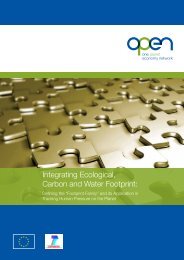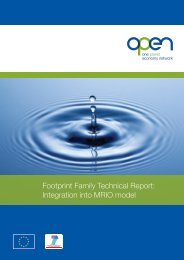OPEN: EU Scenario Storylines Report: - One Planet Economy Network
OPEN: EU Scenario Storylines Report: - One Planet Economy Network
OPEN: EU Scenario Storylines Report: - One Planet Economy Network
You also want an ePaper? Increase the reach of your titles
YUMPU automatically turns print PDFs into web optimized ePapers that Google loves.
and services and find new ways to reduce inputs, minimise waste, improve management<br />
of resource stocks, change consumption patterns, optimise production processes,<br />
management and business methods, and improve logistics. In order to achieve a<br />
resource-efficient Europe, we need to make technological improvements, a significant<br />
transition in energy, industrial, agricultural and transport systems, and changes in<br />
behaviour as producers and consumers. The <strong>OPEN</strong>:<strong>EU</strong> scenarios begin to explore<br />
precisely these types of changes and the associated policy effort needed to bring them<br />
about.<br />
With the help of the <strong>EU</strong>REAPA tool, we will be able to measure the impact of the policy<br />
interventions outlined in the scenario storylines on the Footprint Family of indicators. 17 In<br />
effect, scenarios will thus provide an opportunity for a first test run of the <strong>EU</strong>REAPA tool‘s<br />
ability to evaluate the impact of a specific kind of policy effort. Future users of the tool<br />
will be able to do so themselves, applying the tool to test whatever policy interventions<br />
they wish to define.<br />
The Commission has indentified the need for a vision of where Europe should be in 2050<br />
and a long-term policy framework that can provide a clear path for businesses and<br />
investors:<br />
“It is important to sharpen the focus on the action that has to be taken in the next ten<br />
years to put Europe on the right track and to speed up the transition.” (European<br />
Commission 2011, 2)<br />
In the <strong>OPEN</strong>:<strong>EU</strong> scenario exercise we have started to outline the key elements of a<br />
number of different long-term policy paths for the <strong>EU</strong> to get to a <strong>One</strong> <strong>Planet</strong> <strong>Economy</strong> by<br />
2050. The scenarios take into account the considerable uncertainty facing policy makers<br />
today, and try to demonstrate that the quality of life in the world we ―arrive in‖ in 2050<br />
will vary depending on the path we take to get there.<br />
The approach to building a resource-efficient Europe must be ―complex and interlocking‖<br />
(ibid., 4). Policy measures need to be mutually supportive and we need an overview of<br />
the synergies and tradeoffs between different priorities, areas and policies. Initiating this<br />
kind of an overview has also been the task of the <strong>OPEN</strong>:<strong>EU</strong> scenario exercise and is<br />
something the <strong>EU</strong>REAPA tool is specifically designed to support.<br />
The resource-efficient Europe flagship initiative will make use of roadmaps and scenarios<br />
to build its long-term framework. A series of roadmaps are being developed in order to<br />
ensure that the actions we take now are in fact well coordinated and that concrete<br />
actions already decided for 2020 pave the way towards longer term goals for 2050.<br />
These roadmaps include the Low-carbon economy 2050 roadmap, the Roadmap for a<br />
resource-efficient Europe, and the Energy Roadmap 2050. The Commission will focus its<br />
analysis in the resource efficiency roadmap on three approaches – namely: resource<br />
prices, costs, and subsidies; resource-by-resource, for example where resources come<br />
from and how supplies might change; and sectoral studies – and Commissioner Potočnik<br />
has indicated that he ―attaches more importance to behaviour-changing policies such as<br />
green taxes rather than ‗reactive‘ policies that punish polluters‖ (ENDS Europe 2010).<br />
In order to build up the knowledge base for this initiative and ensure that analysis is<br />
based on common assumptions and a shared vision, the European Commission will<br />
17 This analysis will follow as a subsequent report in the <strong>OPEN</strong>:<strong>EU</strong> project.<br />
Page 47 of 57





